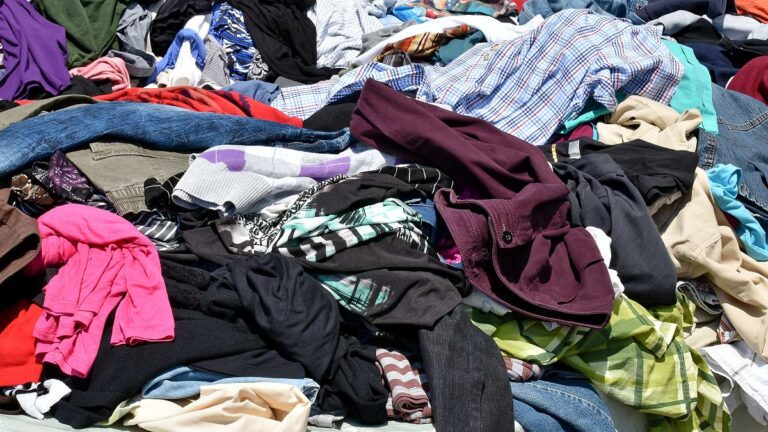The revised Waste Framework Directive has the polluter pays principle at its heart and also aims to reduce food waste.
advertisement
MEPs are backing tough new rules designed to reduce the mountains of discarded clothing and other textile products generated in the EU each year, and want reforms to the bloc’s main waste law to force producers to tackle the growing problem at their own expense.
The European Parliament’s Environment Committee on Tuesday (14 February) adopted a position by 72 votes in favour and 3 against strengthening the European Commission’s original proposals for amending the EU’s Waste Framework Directive (WFD), aimed at tackling the growing problem of textile and food waste in particular.
“This vote sends a clear message that we must prioritize responsible consumption and production practices to mitigate the devastating impact of fast fashion on our planet,” said Malte Galley (German Greens), the Greens’ lead negotiator and shadow rapporteur on the proposal. The German lawmaker specifically pointed to “the staggering damage that fast fashion inflicts on the environment.”
“By addressing destructive practices in our industry – overproduction, excessive waste and resource exploitation – we are taking a decisive step towards a more sustainable future,” Galle told Euronews.
According to the European Environment Agency (EEA), 12.6 million tonnes of textile waste is generated in the EU every year, most of which is incinerated, exported or sent to landfill. Clothing and footwear alone accounts for 5.2 million tonnes, which equates to 12 kg of waste per person per year. Only 22% of this waste is collected separately for reuse or recycling.
While the Commission’s proposal does not provide clear targets for preventing textile waste, MEPs did include a legal clause requiring the EU executive to “set out further rules” by December 2024 for the application of the polluter pays principle and extended producer responsibility (EPR). Essentially, the Commission will be tasked with assessing waste performance targets (prevention, collection, reuse) so that waste prevention milestones can be designed.
One specific addition requested by MEPs is for EU countries to set up a system for separate collection of textile products in municipal waste by January 2025, in the same way that plastics and metals are bagged for recycling. Textile products such as clothing, accessories, blankets, bedding, curtains, hats, footwear, mattresses and carpets would be considered for separation.
Anna Zalewska (ECR/Poland), who was tasked with taking the proposals through Parliament as rapporteur and wrote the draft report that was adopted, noted that better infrastructure to increase separate collection needs to go hand in hand with “more efficient” sorting of mixed municipal waste and ensure that all recyclable products are recovered before being sent to incinerators or landfills.
This aspect of the reform has upset incineration businesses. Patrick Clerence, secretary general of the European Association of Suppliers of Waste and Energy Technology (ESWET), expressed “concern” and “disappointment” about the potential impact of introducing additional waste sorting infrastructure in line with the position adopted by the Commission. He pointed to the fact that no impact assessment was carried out before MEPs agreed to further encourage pre-sorting of mixed municipal waste.
“Not only will this be costly, it will also lead to increased energy and resource consumption and it would be reckless to propose such a plan without estimating the financial and environmental costs,” Klerens said, citing estimates that 60 million tonnes of infrastructure capacity would be needed under the amendments called for by MEPs in their report.
Theresa Mohsen, policy director at campaign group Zero Waste Europe, supported proposals to make textile producers pay to manage their waste, but said they did not go far enough to change current consumption models.
“This reform is just the beginning of the EU’s fight against fast fashion. Stronger regulatory signals are needed, such as textile waste reduction targets and an EPR scheme that incentivises putting less on the market and supports local repair and reuse,” Mohsen said.
Mauro Scaglia, director of sustainable business at the European Apparel and Textiles Confederation (EURATEX), praised Congress’ intention to “harmonize textile EPR regimes” as an important way to achieve circular textiles and ease corporate compliance. He also praised Congress’ “stronger commitment to eco-harmonizing standards” that penalize less environmentally friendly textile materials and encourage the use of easily recyclable materials.
The Environment Committee also agreed that proposed legally binding targets for reducing food waste by 2030 should be increased: to 20% in the processing sector, and 10 percentage points to 40% in the retail and restaurant sectors and in households.
The European Parliament as a whole is due to finalise its position on the bill at its plenary session in March 2024. Negotiations with EU member states are likely to take place after the EU elections in June, while the Council of the EU has yet to broker an intergovernmental agreement on the proposed reforms.


